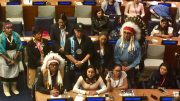(ANNews) – After almost five years since the murder of Colten Boushie, an investigation by the Civilian Review and Complaints Commission (CRCC), has revealed that the RCMP “fuelled racial tensions” in their handling of the case.
On Aug. 9, 2016 Colten Boushie, a 22-year-old Indigenous man, was murdered on the Saskatchewan farm of Gerald Stanley.
Stanley was charged with second-degree murder, but was found not guilty after a 2-week trial that sparked national protests and controversy. The outcome of the trial raised tensions between Indigenous people and the already questionable Canadian justice system.
The RCMP destroyed records of police communications from the night Boushie was murdered and conducted an internal probe into the handling of the case without notifying the CRCC — which is an independent body that investigates public complaints against the police.
In their report released this month, the CRCC also says that the RCMP racially discriminated against Mr. Boushie’s family during the notification of his death. While the CRCC says the case was generally handled professionally, it emphasized some key mis-steps:
– the Boushie home was surrounded by 7 police vehicles;
– police were armed and had their rifles drawn;
– they searched the house unlawfully;
– they failed to preserve forensic evidence;
– they issued press releases which presented the victim in a negative light and enflamed public opinion towards the family;
– and they mishandled witnesses.
“I did not deserve to be treated the way I was treated,” Debbie Baptiste, Colten’s Mother, said at a news conference hosted by the family on Monday morning.
When the RCMP were notifying Baptiste of her son’s death, they asked her if she was drunk and smelled her breath because she collapsed when they told her the news. They also had their rifles drawn because they allegedly believed Boushie had an armed accomplice in the house.
Eleanore Sunchild, a lawyer representing the family said, “When she fell to the floor, after they told her her son was dead, they had the nerve to smell her breath.”
Sunchild then mentioned that when Baptiste told the officers Boushie’s dinner was in the microwave, they “checked the microwave where she had put her son’s dinner to make sure that she was telling the truth.”
“If that doesn’t speak of discrimination and racism, I don’t know what does.”
The CRCC also believes that the officers acted on insufficient information when they surrounded Boushie’s house with their weapons drawn — they also did not have the family’s consent to search the house.
Finally, the CRCC recommends that a change already adopted by the Saskatchewan RCMP — having Indigenous officers review media releases discussing serious incidents involving Indigenous people — be made nation-wide.
The media releases by the RCMP, which were subsequently picked up by major news outlets across the country, were found to have disproportionately focused on the property offences linked to Boushie’s friends and made it seem like his murder was deserved.
RCMP Commissioner Brenda Lucki agrees saying, “There are lessons to be learned from how these media releases were written and perceived.”
As for Lucki, she had the CRCC’s report for over an entire year before she responded to it. Her response was needed to make the report public.
Baptiste said it was “pure torture” waiting for the results of the CRCC’s investigation. “[It] felt like we were swept under the carpet,” she said.
Meanwhile, after all the findings were released, Brian Sauvé, president of the National Police Federation said, “It is clear that the CRCC relied more heavily on Ms. Baptiste’s version — demonstrating a bias against our members’ accounts, despite their handwritten notes made contemporaneously and a written report.
“These broad-brush findings about our members — simply because they are police officers — are not constructive to reconciliation.”
Chris Murphy, another lawyer representing Boushie’s family, defended the family and the report by saying, “There is no way that a mother who has just lost her son makes up a story about police officers searching a microwave for a plate of food.
“Yet in the face of the CRCC’s decision, the RCMP union is still asking people in this country not to believe this woman. Shame on them.”
Prime Minister Justin Trudeau even spoke on the matter during an unrelated announcement in Quebec, “The way they were treated was unacceptable.”
“We have seen, unfortunately, examples of systemic racism within the RCMP, within many of our institutions, and we need to do better.”







Be the first to comment on "Report reveals RCMP fuelled racial tensions in their investigation into the murder of Colten Boushie"